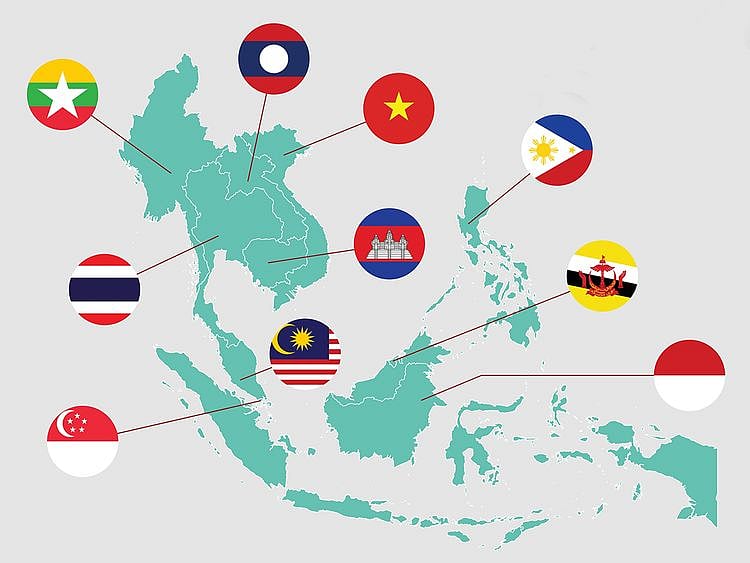After receiving recognition for his successful tenure as the host of the G-20 summit in 2022, President Joko Widodo seamlessly transitioned into the Chair of the Association of Southeast Asian Nations (ASEAN).
As a founding member of this 10-nation bloc, Indonesia, also home to the ASEAN permanent secretariat, is looked up to by other member states for its moderate policies. Indonesia’s regional model has prioritised economic growth, setting an example for ASEAN to focus on cooperative development primarily centred around economic advancement.
President Widodo established himself as a non-aligned broker during his successful G-20 presidency, allowing Indonesia to effectively mediate between different ideological blocs. He strived to maintain stable economic relations for Indonesia and the developing world, aiming to bridge the gap between the West and Russia in the aftermath of the Ukraine war.
However, dealing with issues within ASEAN presents a different set of challenges compared to those addressed at the G-20. ASEAN’s decisions have direct implications for its member countries, making it a matter of utmost importance. Indonesia’s 2023 Chairmanship theme, “ASEAN Matters: Epicentrum of Growth,” seeks to promote the region’s economic potential to global trade and investment partners.
Building on the tone set during his G-20 presidency and hosting the first of two ASEAN Summits last month, President Widodo called for the bloc to unite and address the challenges facing the region. One immediate concern ASEAN faces is the situation in Myanmar, which has been a major source of worry since the military takeover in January 2021.
Different voices within ASEAN suggest various approaches to dealing with the Myanmar junta. Marty Natalegawa, the former Indonesian foreign minister, believes that leaving the seat empty provides the military a comfort zone where they can evade accountability.
Lack of meaningful progress
Malaysia, which has shouldered the burden of Rohingya refugees, expresses frustration with the lack of meaningful progress within ASEAN regarding the violent conflicts in its own backyard. Anwar Ibrahim, Malaysia’s prime minister, has called for a new vision that allows flexibility to navigate the way forward while maintaining ASEAN’s non-intervention principles.
ASEAN’s policy of non-interference and consensus-driven decision-making prevents radical departures from existing policies. President Widodo faced a challenging choice, balancing member frustration over the Myanmar stalemate with the risk of creating divisions within ASEAN by taking more forceful action.
Ultimately, ASEAN adopted a cautious consensus-driven approach by emphasising the implementation of the 5-point plan agreed upon with Myanmar, aimed at restoring normality. Despite the generals’ resistance, ASEAN decided to maintain the current level of Myanmar’s participation in its meetings, allowing for unofficial involvement.
Myanmar has been plagued by a low-level insurgency since the civilian government was toppled, hindering the delivery of much-needed humanitarian aid.
ASEAN’s accelerated development
ASEAN leaders have called for the creation of a conducive environment for safe and timely humanitarian assistance and inclusive national dialogues. The organisation has also expressed concern over the violence in Myanmar and urged an immediate cessation of all forms of violence and the use of force.
President Widodo, while recognising the situation in Myanmar, emphasised that it should not hinder ASEAN’s accelerated development. Another significant issue ASEAN faces is its approach towards China and the contested claims of some member states in the South China Sea.
President Ferdinand Marcos Jr. of the Philippines, following new agreements with the US, expressed a desire for a more decisive and unified action from ASEAN regarding this matter. In response, ASEAN welcomed initiatives to expedite the negotiations on the Code of Conduct (COC) to effectively manage disputes in the South China Sea.
The greatest pressure on ASEAN lies in maintaining its neutrality amid the growing geoeconomic and geostrategic competition between the US and China. For now, ASEAN remains firm in its position, recognising that maintaining neutrality is essential for preserving its centrality.
Sajjad Ashraf served as an adjunct professor at the Lee Kuan Yew School of Public Policy, National University of Singapore from 2009 to 2017. He was a member of Pakistan Foreign Service from 1973 to 2008 and served as ambassador to several countries.
Sign up for the Daily Briefing
Get the latest news and updates straight to your inbox
Network Links
GN StoreDownload our app
© Al Nisr Publishing LLC 2026. All rights reserved.
